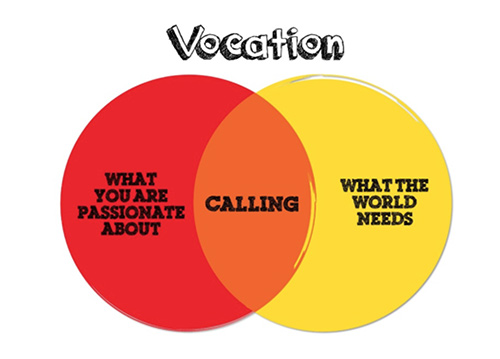Let’s dispose of the idea that leadership has anything to do with position. I don’t believe that true leadership is something you find in a job description or comes with being the “boss.” Instead, I want to explore leadership as something that lives and breathes. I want to look at leadership as a calling.
First let’s look at the concept of vocation. In her book, From Career to Calling: A Depth Psychology Guide to Soul-Making work in Darkening Times, author Suzanne Cremen tells us that “Vocation comes from the Latin vocātio, meaning a calling, or to be addressed by a voice” (p. 5). It is in heeding our calling that we find what Cremen calls the “red thread” that can lead us to recognizing and fully embodying our vocation. I experience this as an insistent tug, an intuitive pull that informs me of what I need to do and where to go next.
When I step back and look at the various types of work I’ve done as an adult, there are a number of themes that show themselves. The most prominent are trauma, healing, mental health and wellness. But if I peel back another layer I find two more: creativity and leadership. While the former themes reveal where my focus is, creativity and leadership demonstrate how I show up. I’ve never wanted a job as a supervisor, or manager, so this is very definitely not about position. Rather, it’s an ability to see the gaps and then listening to that voice, the calling that insists I do something about it. This is my red thread; leadership is very much a part of my vocation.
When we embody leadership it’s not about checking something off our to-do list. I think it’s much easier to share leadership from this place because it’s also not about obligation, duty, or power over others. If there is no need for my leadership (no tug, no call), I can move back and support others as they step into their personal power, and heed their own calling. Understanding leadership this way is liberating; it doesn’t have to be connected to a job. We’re not waiting for the “person in charge” to step up. We’re empowering ourselves – whether it’s in our work, home life or community – to do what we feel needs to be done.
There is also something deeply satisfying about being in service to calling. Cremen gives us insight as to why:
The idea of vocation as a form of self-expression, personal authenticity and fulfilment came to the fore – the idea that one could make something beautiful, creative, artful, useful, meaningful through one’s work in the world. The idea that one could do work of which one might feel justifiably proud, and in the process, craft oneself through one’s work (p. 5).
I’ve known so many people who, without the title or the position, show up as leaders. And while you may not consider leadership as a strand in your red thread, all of us our called to leadership at different times. I feel like a broken record these days, but truly, we need authentic, kind and brave leadership more than ever. I hope, if you’re not already, that the next time you hear that voice, or feel that tug, that you’ll answer the calling.

Really outstanding writing! I really like the part about being “addressed by a voice”, as it relates to the red thread. In terms of power, one of the hardest times in my life was when I was seduced by power, if I had to now define it. I knew something happened because I wound up in treatment and I kept saying, “I can no longer hear”, as per my spiritual input “voice”, so to speak. Though the statement was misunderstood, what is important to me now is, when the voice goes silent, or softer, I call a peer friend and get back to my foundation as a leader. I have drifted too far out! This, my form of mental health “lapse”, so to speak. Timely article for me! Thank you, as always.